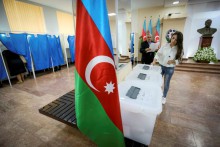Azerbaijan has held a referendum on making changes to the constitution. According to Central Election Commission, the turnout of voters was more than 60 percent, against the required minimum of 25 percent, two hours before the closure of polling stations. Nobody in fact doubted that the voting would be smooth and citizens would support making amendment to the Fundamental Law. The opinion polls conducted by the US organization AJF & Associates on the eve of the voting showed that 92.8 percent of the respondents agreed to making amendments and changes to the constitution. A French survey institute, Opinion Way, predicted that 87 percent of the pollees would support the initiative.
Incidentally, the constitution is being amended for a third time.
The first large-scale alterations were introduced in August 2002, when 39 amendments to 24 articles were made. In particular, it was intended to establish the office of human rights commissioner (ombudsman), grant citizens the right to turn directly to the constitutional court, and vest the Milli Majlis (parliament) with the authority to appoint appeal court judges on the president’s recommendation. The Azerbaijan law was thus brought closer to European norms.
In late 2008, the ruling Yeni Azerbaycan (New Azerbaijan) party initiated making changes to the constitution after the presidential elections which the sitting president Ilham Aliyev won for a second time. In March 2009, 41 amendments to 29 articles were made after a referendum, especially one on lifting the limit on the number of consecutive presidential terms.
The latest referendum approved introducing a provision on the dissolution of Milli Majlis and lowering the minimum age for members of parliament from 25 to 18 years. According to demographic data, young people account for 66 percent of Azerbaijan’s population. Local experts say there is every reason to get them involved in active social, political, economic, and cultural life of the country. The amendment on reducing the parliamentary candidacy age thus takes this point into account.
The offices of first vice president and vice president are to be established now. The former will be vested with the powers of the head of state if the latter discontinues carrying out his or her duties ahead of schedule. In the previous version of the constitution, these powers were to be transferred to the prime minister.
Besides, the president of Azerbaijan is now being vested with the right to dissolve parliament ahead of schedule and call an early election of the head of state. Should these elections be held, the election campaign time will be reduced from 90 to 60 days.
According to Ilgar Velizade, head of the South Caucasus political science club, “the brunt of the executive power will be borne by the institution of the presidency, from now on reinforced with vice presidents,” while the prime minister will mostly focus on economic issues.
The past referendum approved changes to Article 100 which will no longer set an age limit for presidential candidates. Earlier, only a person “not younger than 35 year old” could run for this office.
The second important innovation is that Article 101 sets a seven-year, not a five-year, term of presidential office. The next elections of the head of state are slated for 2018, and if Ilham Aliyev runs for office, which is now beyond a doubt, his fourth term will expire in 2025. The amendments to the two abovementioned articles seem to be interconnected.
Some observers in Baku and especially abroad link amendments to the two articles with the age of Ilham Aliyev’s son Heydar. He will turn 28 in 2025. This seems to ensure a dynastic continuity. However, Velizade does not link the cancellation of the age limit for topmost officials with the likely entry of the sitting president’s son into politics. “I do not think the succession of power is so high on the agenda. The current President Aliyev is not yet 55, which is the prime of a politician. Besides, the amendments made to the constitution seven years ago allow the president to be reelected for an unlimited number of times,” he says. By all accounts, these presumptions are somewhat premature.
The Fundamental Law is being amended with due account of changes in the domestic and international situation. As the arc of instability is more and more approaching Azerbaijan, it is not surprising that its leadership is taking measures to maintain domestic stability, taking into account the ever growing challenges. Besides, one should also take into account the unresolved conflict over Nagorno-Karabakh and its negative impact on the situation in the state.
The oil price drop has dealt a serious blow to Azerbaijan’s economy and aggravated the problem of speedier reforms in the economy and finances. Developing the non-oil sector is not just on the agenda but is an urgent need now. This demands that the governmental structure be stable, and the adopted amendments pursue this very goal.
It is also important to take into account the referendum’s political aspect. It was proved again that the secular opposition in Azerbaijan is weak and fragmented. The calls of the Musavat party to boycott the referendum found no support. Even according to oppositionists, anti-referendum rallies gathered a few thousand people only. Clearly, they are too few to seriously rival the authorities.
Although European experts have subjected the proposed amendment to criticism, this seems to be the end of it. Azerbaijan is too important a player in the Caspian Sea basin to be subject to any measures. As Nezavisimaya gazeta reports, the embassies of the US, Britain, and France conducted active consultations with local oppositionists in the second half of August. That’s all so far.
As for Ukraine-Azerbaijan relations, they rest on mutual respect for territorial integrity and form a solid basis for more intensive economic cooperation. A stable Azerbaijan is an old friend of this country – let us hope, for many years to come.








